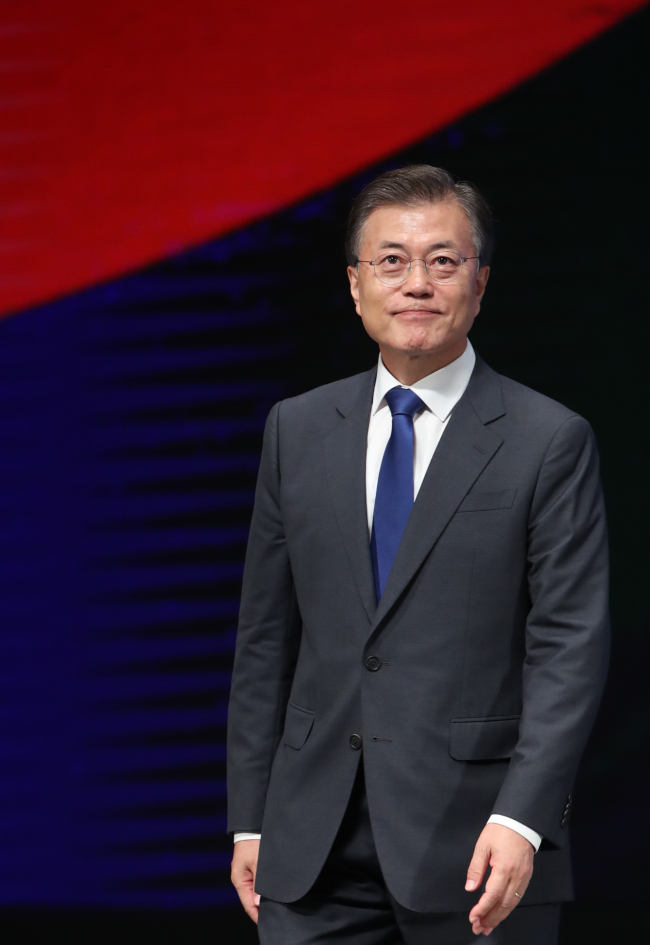Emboldened by high-flying popularity, President Moon Jae-in has pushed for some very bold reforms aimed at “renewing” South Korea, which have garnered support and criticism alike. Here are Moon’s five most controversial agenda items.
Nuclear-free nation
On June 19, Moon declared a major shift in the nation’s energy policy.
His vision is to phase out nuclear energy, which now provides one-third of Korea’s electricity needs, while increasing the usage of renewables to 20 percent and liquefied natural gas to 37 percent by 2030. The plan went as far as to scrapping the ongoing construction of reactors Shin-Kori No. 5 and 6, which are about 28 percent complete.
While some environmentalists hailed the move as a giant step toward a greener South Korea, the bold push sparked a heated debate, sharply dividing the public and experts.
While many fear a rise in electricity prices or a power shortage in the future, some experts warn against a hasty move away from nuclear energy, saying the goal of 20 percent renewable energy may turn out to be far more difficult to achieve.
The most contentious of all issues related to Moon’s energy plan is the fate of the two Shin-Kori nuclear reactors. A special body will gather public opinions on the issue and make a recommendation to the government in October.
Income-led economic growth model
On the economy, the president seeks to create a whole new growth model that is driven by greater household incomes. He says income growth will create a virtuous economic circle, boosting domestic consumption and leading to an increase in corporate earnings.
To realize this, jobs need to be created. Moon stresses the government must take the lead and create more jobs in the public sector, an idea his opponents say could put pressure on fiscal conditions in the future.
Moon’s other core pledges related to this new economic model include a drastic hike in the minimum wage and a campaign for no irregular workers in the public sector, which envisions giving permanent employment status and benefits to workers on short-term contracts as well as subcontracted workers.
While the plan has been mostly viewed positively by the public, business circles as well as some economists have sounded warnings that export-oriented industries could lose price competitiveness due to increased labor costs and be forced to move production bases overseas.

President Moon Jae-in (Yonhap)
President Moon’s overhaul also reached the national health care program.
On Aug. 9, he announced a plan to expand the National Health Insurance coverage to almost all areas of medical services, aside from cosmetic surgeries. Under the new health care plan, medical expenses for ordinary people would decrease by an average 18 percent. Those in the low-income bracket are to benefit most, with a reduction of up to 46 percent.
The cost is, again, the subject of dispute.
Moon said the reform would cost up to 30.6 trillion won ($27 billion) over the next five years, and that it would be covered partly by the cumulative surplus of the state-run insurance scheme, running at about 10 trillion won, and the remaining by the government budget.
Opponents say the plan will inevitably create “tax bombs” for South Koreans, as costs will only rise in the future after the president’s term ends, with the increase of the elderly population. The main opposition Liberty Korea Party said the president is “blinding the people with rosy illusions.”
Correcting past wrongsTaking office in the wake of the corruption scandal that led to the ouster of conservative President Park Geun-hye, Moon has vowed “to get rid of the wrongdoings of the past” – or of the past decade ruled by his conservative opponents, to put it more bluntly.
The scope of his campaign has reached the nation’s most powerful institutions – the National Intelligence Service, prosecutors and the Army.
Amid investigations and internal audits into those and other key bodies, the conservative parties -- the Liberty Korea Party and splinter Bareun Party -- denounced Moon, saying he is only trying to justify his vengeance against past governments.
Peace initiative for North Korea
Military threats from North Korea have reached a new level in the Moon presidency, with the communist regime successfully test-firing intercontinental ballistic missiles and threatening to strike the US island of Guam.
The developments have put to test Moon’s vision for inter-Korean peace, unveiled in Berlin on July 6.
Right-wing groups have called Moon naive and aloof for maintaining dialogue and a diplomacy-centered approach toward the increasingly defiant and belligerent North.
As military tensions have spiked recently amid a tit-for-tat between US President Donald Trump and the North’s Kim Jong-un, Moon has taken a tougher stance on the North, resuming the stalled deployment of the US-led Terminal High Altitude Area Defense anti-missile system. He also sought to assure the public that the government would do everything to avoid another war on the Korean Peninsula.
By Jo He-rim (herim@heraldcorp.com)






![[Graphic News] More Koreans say they plan long-distance trips this year](http://res.heraldm.com/phpwas/restmb_idxmake.php?idx=645&simg=/content/image/2024/04/17/20240417050828_0.gif&u=)